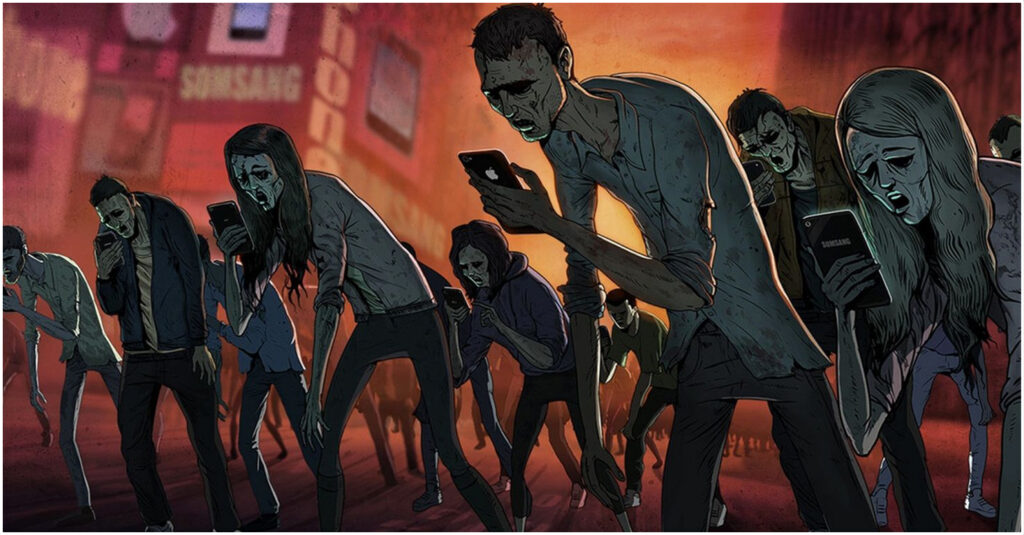
‘Logic will get you from A to B. Imagination will take you everywhere.’ ~ Albert Einstein
from consumer to consumed
In response to concerns about the ill effects of the 18th century’s Industrial Revolution, romantic poet William Blake believed that once the energy of imagination is used effectively to realise the connection between man and nature, the individual gains freedom from the restrictive bonds of unimaginative thought. I think this view is more pertinent than ever with regard to the homogenising effects of present-day technology on the collective imagination.
We are a far cry from the kind of creatively vibrant, and frequently rebellious, movements seen in the 20th century and I feel strongly that social media is having as much a detrimental effect on artistic freedom as it is on society in general. Nowadays, the arts and humanities strike me as increasingly docile, largely as a result of being colonised by the ubiquitous banality of US cultural imperialism, facilitated by the absolute conformity to an online culture utterly devoid of ‘the energy of imagination,’ mediated through a mass addiction to Smartphones. I find it ironic how Big Tech has not only made society less democratic, it also seems to have precipitated an art scene that has increasingly become the sole province of the privileged; the end result being the pervasively generic, corporate climate in which we currently find ourselves.
As someone from a low income background, who long held a romantic view that the arts were open to anyone irrespective of socio-economic status, I’m genuinely curious to know if it’s even possible to succeed as an artist or writer in this day and age without personally using any of the big four (YouTube, Facebook/Instagram, Twitter and TikTok). If not, then what does that say about the current state of society and the arts? Is Big Tech’s colonial takeover complete? Is the 21st century destined to embody a Post-resistance Era of predominantly vapid art by posh, virtue-signalling bores? Poking fun at Rick Astley, Bill Hicks once joked that music was going the way of ‘government-approved rock’ (I wonder what he’d make of the state of today’s music!). Is this really to be a century defined by establishment-approved arts?
The Romantics were concerned with the outwardly destructive effects of industrialisation on the natural environment. This of course is still happening, as we lay waste to our lush rainforests, the lungs of the earth abundant with life, and pollute vast oceans so a minority of greedy people can increase their profits while millions buy shit they don’t need, ignorant of the terrible burden this puts on our beautiful planet.
It’s incredible to think that, surrounded by billions upon billions of other stars and planets, after billions of years of evolution, we stand alone as a cosmic miracle and just look at what we do with it!
Martha Gellhorn wrote: ‘It would be a bitter cosmic joke if we destroy ourselves due to atrophy of the imagination.’
Is this where we’re at now? Not content with destroying the sublime in pursuit of something unimaginatively meaningless, have we since turned inwards to realise progress’s goal of self-annihilation? Have we evolved from the Consumer to the Consumed?

I hate social media. It is proving to be detrimental to the arts, democracy, health and freedom – basically everything that’s worth anything in this life. I loathe it with a passion.
I briefly joined Twitter during the first and second lockdowns, quickly deleting it again each time. To be fair, I did not find myself on the receiving end of any vitriol (although I didn’t interact that much), I just found it depressing to observe the way many people behaved and wondered what the hell do all those idiots hope to achieve squealing at one another in such an infantile manner?
From what I can gather, Twitter and Facebook are places to be mean and spiteful; Instagram is where narcissists post innumerable selfies, while TikTok appears to be a Trojan horse invented by the Chinese for the sole purpose of laughing at neurotic American liberals bleating about their inane, first-world problems as society crumbles around them.
We are self-evidently getting dumber and more conformist as a race and it’s the latter that I want to focus on here. Many of you will be aware of the ‘Culture War’: petty, pointless online bickering between conservatives and the boutique left, which predominantly exists to benefit corporations and vapid, virtue-signalling celebrities. The whole thing is a useful distraction for power, and is most hotly contested on Twitter, but there was one particular altercation that caught my attention, which brings me to the image above that I came across while briefly using Twitter during the second lockdown.
Unfortunately, the other person tweeting deleted their account before I could get a screen shot, but it was basically a disagreement over whether or not sex work is work and should be promoted as such, particularly to young women attending university as a means to supplement their studies.
I am not interested in getting into the ins and outs of the ethics of sex work here but, for what it’s worth, it’s always struck me as something (mostly) women do out of desperation, or worse are trafficked and forced into it. I suppose it’s perfectly possible there are some sex workers out there who choose their profession and even enjoy their chosen career (to each their own). Nevertheless, I remain intrigued, in this instance, as to how this particular individual shows clear signs of what I have come to call ‘the Consumed.’
(Note: I’m aware this person could be a bot or a troll, but I think it’s interesting to explore the implications of what it means to take their comment at face value).
The above tweets are a rather striking example of how technology has taken us from the 20th century Consumer into the 21st century’s Consumed. We are not just customers ‘choosing’ to buy products anymore. Now, everything about YOU – your feelings, opinions, politics, gender, pronouns, favourite films, what you eat, where you holiday, who you fuck – exists entirely to be consumed by others online, as much as surveilled by creepy tech organisations who process everything you post and feed back to you in the form of adverts telling you what shit to buy; then silo you into echo chambers saturated with algorithmically vetted thoughts to the point one’s head explodes should one come up against anyone holding a contrary view. It embodies the Consumer-Consumed Matrix, and leaves me with little hope for the human race.
The above image is a clear example of the culmination of the neoliberal dream, i.e., it’s not just feelings and opinions being wilfully consumed, this person appears to celebrate their own body being consumed in exchange for money and to sincerely believe that this represents a ‘choice,’ which liberates them. They show no inclination towards reflection or willingness to question their situation whatsoever. To me, it really is a striking example of the evolution of the human experience from Consumer to Consumed: total acquiescence – and to be celebrated!
Going by the language from the above tweet, I think it’s fair to assume the individual in question is from the US. It’s interesting to note that instead of wondering why they live in a country which can spend billions on national security, and billions on military foreign aid to countries like Israel, instead of investing in the futures of its youth to attend university and not come out of it crippled by debt (nor resort to anything as precarious – or dangerous – as sex work to pay the bills), or offer its society free healthcare; instead of doing the hard thinking and asking inconvenient questions regarding the grotesque way Western governments prioritise war and death over life and health; I would argue this individual shows signs of total acquiescence in servitude of power, convinced in the belief that to be consumed is something liberating. ‘Don’t think’ is a veritable mantra of the neoliberal creed!
Of course, not everyone will embrace being consumed in such an extreme way, but I think the point stands. A less severe example would be the growing middle class trend towards the obsession with gender identity and the use of pronouns – all things to be consumed via highly centralised tech platforms.
Looking back at the 20th century’s golden age of the Consumer now seems like reminiscing on a freer time. Sure, we were bombarded with banality and freedom was, for the most part, an illusion while violence, greed and materialism ran amok. Nevertheless, bastions of liberty did exist, mainly in the arts while others, with a spirit of adventure, simply chose to live off-grid as travellers. Those days are gone; we are no longer 20th century Consumers, where there was at least a modicum of freedom and space for creativity. Now, we are all but colonised through a mass addiction to Smartphones and social media.
Not only is our freedom rapidly diminishing, I also believe our age of the Consumed is giving us a skewed idea of hardship. The fact that people can seriously entertain celebrities, some of the most privileged and pampered individuals in the history of humankind, as somehow being victims of oppression or hardship is testament to a superficial age of idiocy epitomised by the Consumed. To me, it’s indicative of a monstrous obliviousness to far greater hardships, such as that suffered by millions living on the streets in cities across the globe – an invisible mass of despair without a home and without a voice.
For politicians (or anyone for that matter) to seriously entertain that words are ‘literal violence,’ as Western bombs are literally raining down on some of the poorest people on the planet, can only have led a truly pampered life utterly ignorant of any real hardship (for me, this sorry fact is demonstrated repeatedly by what passes for journalism today).
This, among other things, I would argue, is one of the many negative effects of the bourgeoisfication of the arts, media and politics, i.e., it is now dominated by people most of whom appear to have never encountered any real hardship – and to whom the system is self-evident, without alternative, at most to be ‘tweaked’ by token gestures rather than changed – hence the aforementioned suffering acts more as a vehicle to signal one’s virtue, and thus further one’s career by improving one’s image, rather than a sign that things seriously need to change and that the ultra-privileged, i.e., celebrities and their rich backers (not to mention the liberal media), need to face up to the hypocritical role they play in sitting atop the very thing they purport to oppose (this is something Trump understood all too well, and I wonder how long before the penny finally drops among those who proclaim to be his opposite before they witlessly help to facilitate another round of populism?).
I share the Romantics’ concern regarding the continued, destructive effects of industrialisation on the natural environment. However, I also fear we have taken it a stage further through the banal use of technology in the form of Smartphones and social media, i.e., are we now destroying ourselves within?
Have we become the Consumed?
January 2022
© Percival Alexander